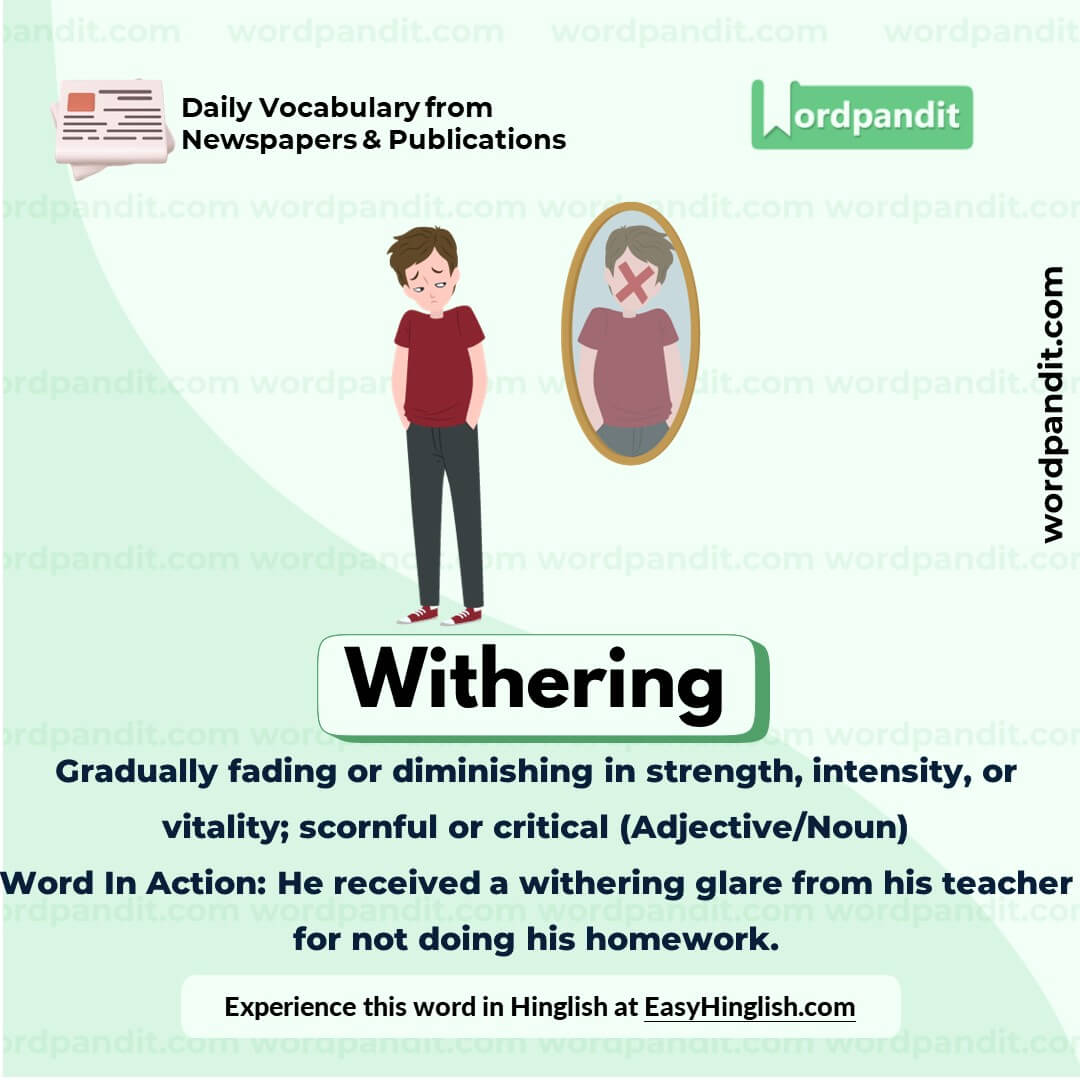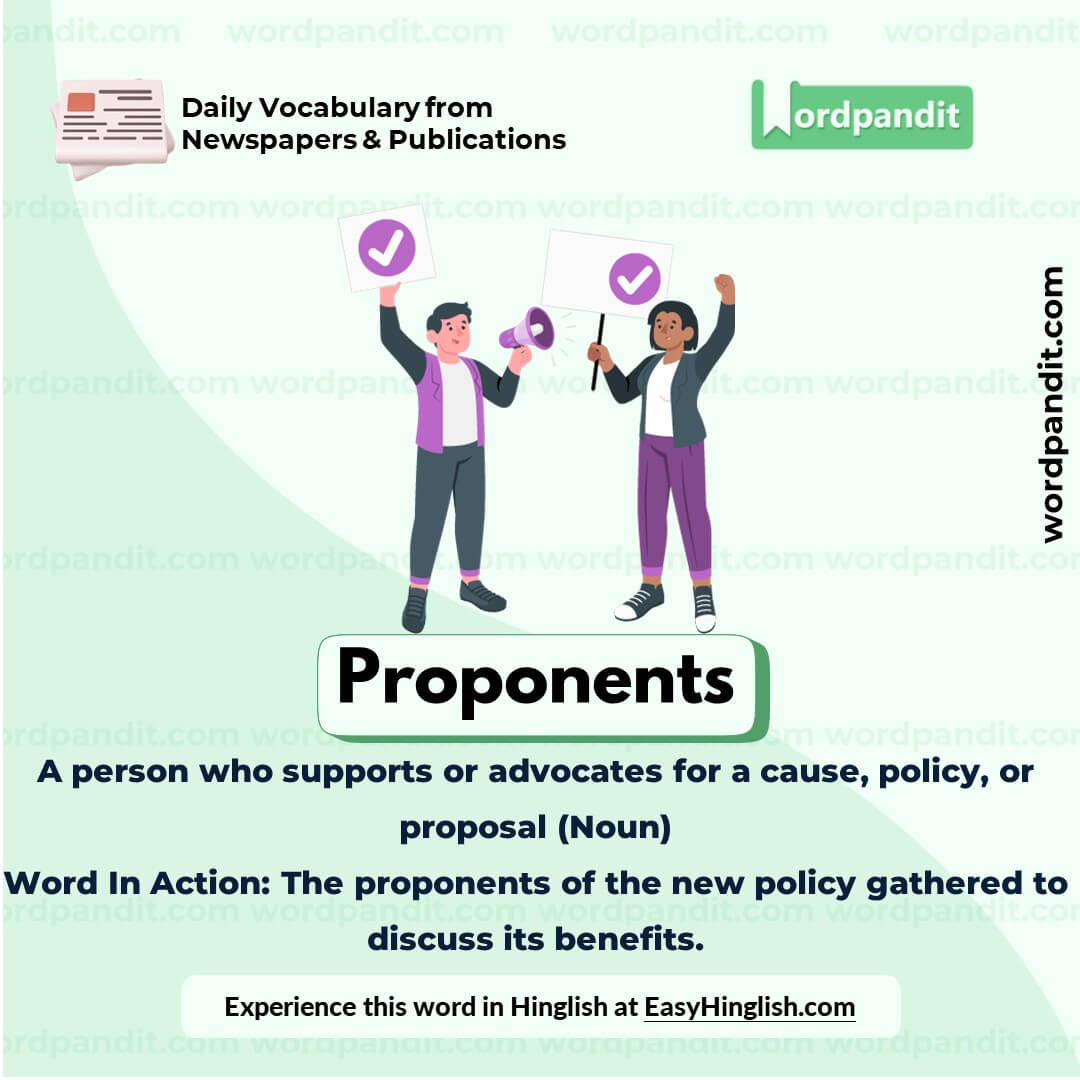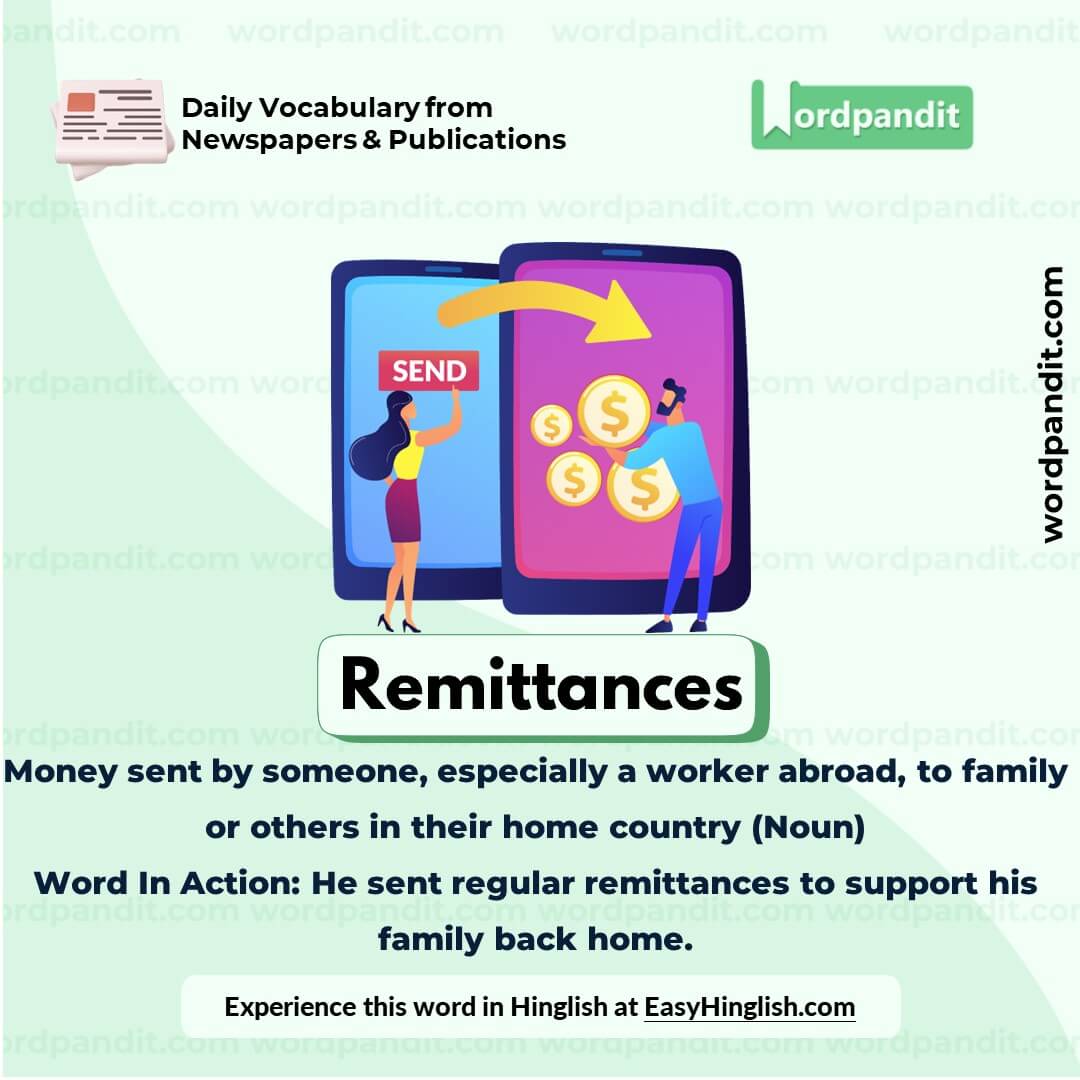Daily Vocabulary from International Newspapers and Publications
Expand Your Vocabulary with Wordpandit’s Global Vocabulary Hub
At Wordpandit, we are committed to helping you develop a truly global vocabulary by drawing from some of the most respected international publications. This section is designed to keep you ahead of the curve by introducing you to words that define global conversations and trends.
The Power of Global Sources
To help you think and communicate on a global scale, we curate vocabulary from renowned international sources, such as:
- The New York Times
- The Washington Post
- BBC
- The Guardian
- The Economist
- Scientific American
- Psychology Today
- And many more...
Stay Global, Stay Competitive
Our daily updates from international publications ensure you are consistently exposed to new words that reflect global news and developments, making sure your vocabulary is not only current but also globally relevant.
Enhance Your Global Perspective
Whether you’re preparing for international exams, aiming to excel in global business communication, or want to enhance your language skills for personal growth, Wordpandit offers the resources you need to thrive in a global context.
Effective Learning, Global Reach
Our learning methodology combines global examples, memory aids, and interactive activities, allowing you to internalize new words effectively and apply them in real-world scenarios.
Begin Your Global Vocabulary Journey Now!
Why Choose Wordpandit?
Practical Learning: Focus on words you'll actually encounter in real-world reading, enhancing your comprehension and communication skills.
Diverse Content: From current affairs to scientific breakthroughs, our varied sources expose you to vocabulary across multiple domains.
Effortless Integration: Make Wordpandit a part of your daily routine. Just a few minutes each day can significantly boost your lexicon over time.
Your Path to Vocabulary Mastery
- Visit our Daily Vocabulary section regularly
- Explore new words and their usage in context
- Practice incorporating these words into your own writing and speech
- Track your progress as your vocabulary expands
Start Your Journey Today
Embark on your vocabulary enhancement journey with Wordpandit. By consistently engaging with our daily posts, you'll build a robust vocabulary that serves you well in academic, professional, and personal contexts.
Remember, a word a day keeps linguistic limitations at bay. Make Wordpandit your daily companion in the quest for vocabulary excellence!
WORD-1: Withering
Context:
"Difficult" is the key word here. In the past, before the withering away of censorship." - BBC
Explanatory Paragraph:
The word "withering" is often used to describe something that is diminishing, shrinking, or fading away, either literally or metaphorically. It can refer to a critical, scornful attitude that causes harm, or the gradual decline or weakening of something.
Meaning: Gradually fading or diminishing in strength, intensity, or vitality; scornful or critical (Adjective/Noun).
Pronunciation: WIT-ther-ing
Difficulty Level: ⭐⭐ Intermediate
Etymology: Originating from Old Norse "viðr", meaning weather, with "withering" developing in English to describe effects of harsh weather and later to signify decline or destruction.
Synonyms & Antonyms:
Synonyms: Fading, declining, scornful, diminishing, shriveling
Antonyms: Flourishing, thriving, growing, invigorating
Usage Examples:
- The withering glare of the critic left the artist shaken.
- Over time, the once-mighty empire faced a withering decline.
- The withering away of support for the policy led to its eventual collapse.
- Her withering remark silenced the room in an instant.
Cultural Reference:
"Withering Heights" by Emily Brontë, though a play on "Wuthering," evokes themes of emotional intensity and decline, showcasing the harshness and beauty of human emotions and nature. - Literary Analysis
Think About It:
How does the "withering" of societal censorship affect freedom of expression and accountability?
Quick Activity:
Write a sentence using "withering" in both its literal and metaphorical sense.
Memory Tip:
Think of a "withering" flower—its petals shrinking and fading, just like something declining in strength or intensity.
Real-World Application:
"Withering" is commonly used in critiques or discussions about societal, political, or personal declines, making it relevant in academic writing, literature, and journalism.
WORD-2: Dwelling
Context:
"Late October, on a park bench outside his makeshift dwelling, the 38-year-old described life at the homeless encampment where he lives with about a dozen or so others as 'depressing'." - BBC
Explanatory Paragraph:
The word "dwelling" refers to a place where someone lives, such as a house, apartment, or temporary shelter. It emphasizes the concept of a living space, whether permanent or makeshift, and is often used to highlight the conditions or nature of the living environment.
Meaning: A place of residence or habitation; a home (Noun).
Pronunciation: DWELL-ing
Difficulty Level: ⭐ Basic
Etymology: Derived from the Old English word "dwellan," which meant "to lead astray" or "to hinder," later evolving to signify a place where one stays or resides.
Synonyms & Antonyms:
Synonyms: Residence, abode, home, shelter, habitat
Antonyms: Vacancy, homelessness, void
Usage Examples:
- The tiny dwelling was barely enough to accommodate the growing family.
- Many nomadic tribes carry portable dwellings to suit their lifestyle.
- The hillside was dotted with quaint dwellings surrounded by lush greenery.
- They constructed a makeshift dwelling from available materials after the storm.
Cultural Reference:
In J.R.R. Tolkien’s "The Hobbit," the comfortable hobbit-hole is a prime example of a cozy dwelling symbolizing contentment and safety, contrasting the adventures outside. - Literary Analysis
Think About It:
How does the nature of one’s dwelling affect their quality of life and sense of identity?
Quick Activity:
Draw or describe your ideal dwelling, considering its size, location, and design.
Memory Tip:
Picture the word "dwelling" as a dwelling itself—think of the double "l" as the walls of a cozy home!
Real-World Application:
"Dwelling" is often used in discussions about housing, urban planning, and living conditions, making it a key term in social studies, architecture, and public policy.
WORD-3: Proponents
Context:
"Proponents of banning encampments say that the campsites lead to disorder, and that funding should go to getting people off the streets." - BBC
Explanatory Paragraph:
The word "proponents" refers to individuals who actively support or advocate for a particular idea, policy, or cause. Proponents are often engaged in promoting or arguing in favor of their position, emphasizing its benefits or necessity.
Meaning: A person who supports or advocates for a cause, policy, or proposal (Noun).
Pronunciation: pro-PO-nents
Difficulty Level: ⭐⭐ Intermediate
Etymology: From the Latin "proponere," meaning "to put forth," combining "pro-" (forward) and "ponere" (to place).
Synonyms & Antonyms:
Synonyms: Advocate, supporter, champion, backer, promoter
Antonyms: Opponent, critic, adversary, detractor
Usage Examples:
- Proponents of renewable energy argue that it is essential for combating climate change.
- The proponents of the new law believe it will reduce traffic congestion in the city.
- She was one of the most vocal proponents of women's rights during the movement.
- The proponents of the project organized a campaign to gain public support.
Cultural Reference:
Proponents of civil rights, such as Martin Luther King Jr., advocated tirelessly for equality and justice, shaping the history of societal change. - Historical Analysis
Think About It:
What makes a person a strong proponent of a cause, and how can their advocacy inspire change?
Quick Activity:
List three causes or policies you are a proponent of and explain why.
Memory Tip:
Remember "proponents" as those who "propose" ideas and push them forward in discussions and debates.
Real-World Application:
"Proponents" is a crucial term in academic writing, policy discussions, and public debates, used to highlight individuals or groups advocating for a specific stance or reform.
WORD-4: Arduous
Context:
"Sometimes using long and arduous routes designed to dodge border controls. To afford this, many sell farms or take out loans." - BBC
Explanatory Paragraph:
The word "arduous" describes tasks or journeys that are extremely difficult and require significant effort, endurance, or determination. It often conveys a sense of physical or mental strain over an extended period.
Meaning: Involving or requiring strenuous effort; difficult and tiring (Adjective).
Pronunciation: AR-joo-uhs
Difficulty Level: ⭐⭐⭐ Intermediate
Etymology: From the Latin word "arduus," meaning "steep" or "difficult to climb," emphasizing the challenges associated with the term.
Synonyms & Antonyms:
Synonyms: Difficult, strenuous, challenging, grueling, laborious
Antonyms: Easy, effortless, simple, straightforward
Usage Examples:
- Completing the marathon was an arduous challenge that tested her limits.
- Building the Great Wall of China was an arduous task that spanned centuries.
- Climbing the steep mountain path proved to be an arduous journey for the hikers.
- He described his studies in law school as arduous but ultimately rewarding.
Cultural Reference:
The story of the Odyssey by Homer portrays the arduous journey of Odysseus, who faces numerous challenges on his way home. - Mythological Reference
Think About It:
Why do people undertake arduous tasks or journeys despite the difficulties involved? What motivates them?
Quick Activity:
Write a short paragraph about an arduous task you have completed or aspire to complete.
Memory Tip:
Think of "arduous" as climbing a steep hill ("arduus" in Latin), symbolizing the effort and difficulty required.
Real-World Application:
"Arduous" is often used in literature, academic texts, and everyday language to describe difficult tasks or journeys, especially those requiring persistence and strength.
WORD-5: Remittances
Context:
"Many funded their move through non-institutional loans, later sending remittances to their families." - BBC
Explanatory Paragraph:
The word "remittances" refers to money that individuals send, typically to support family or friends, often from one country to another. These funds are crucial for many households, especially in developing countries, as a source of financial support and economic stability.
Meaning: Money sent by someone, especially a worker abroad, to family or others in their home country (Noun).
Pronunciation: re-MIT-uhn-ses
Difficulty Level: ⭐⭐ Intermediate
Etymology: Derived from the Latin "remittere," meaning "to send back," indicating the act of sending money or resources back to a place of origin.
Synonyms & Antonyms:
Synonyms: Payments, transfers, funds, allowances, contributions
Antonyms: Debts, liabilities, withdrawals
Usage Examples:
- She sends monthly remittances to her parents in her hometown to cover their living expenses.
- The country's economy heavily relies on remittances from workers abroad.
- Remittances have helped improve healthcare and education in many rural communities.
- The bank offers a convenient remittance service for international money transfers.
Cultural Reference:
In the Philippines, remittances from overseas Filipino workers (OFWs) are a significant source of economic growth, supporting millions of families and contributing to national development. - Economic Studies
Think About It:
How do remittances impact not just families, but also the economies of both the sending and receiving countries?
Quick Activity:
Research the role of remittances in a country's economy and write a short summary of your findings.
Memory Tip:
Think of "remittances" as money that "remits" or is sent back to provide relief and support to loved ones far away.
Real-World Application:
"Remittances" are widely discussed in economics, migration studies, and global development. They highlight the interconnectedness of global labor and the financial contributions of migrant workers to their families and home countries.
















